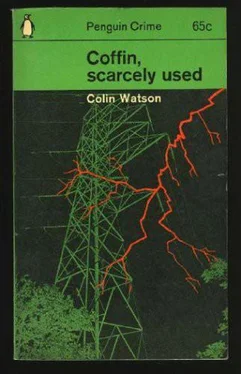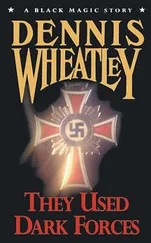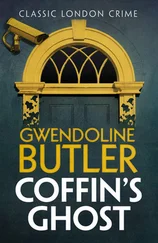Purbright padded round the table and glanced into a wall cupboard. It was empty except for a thick file of newspapers. Near the window, he bent down and picked from the floor a piece of silky material, a headsquare or small scarf. He handed it to Mrs Poole.
She shook it out with faint distaste. “Something of hers, I suppose,” she said, folding it quickly and putting it on a dusty, black-painted mantelpiece beside a stone ink bottle and a spike of faded cuttings.
“Not what you might call a cosy room,” Purbright remarked.
“Mr Gwill didn’t like to use anywhere else when he had business to attend to. He used to say no one could work properly if they were comfortable.”
“Then it seems Mrs Carobleat called partly, if not altogether, for business reasons?”
Mrs Poole stared at him, then glanced at the folded scarf. “I don’t know why she came. She used to push her own way around and I always kept clear until I heard her leave.”
Purbright gave the desk cover a casual trial with one finger. It was unlocked and slid back easily. The compartments inside contained a few tidily stacked papers. He did not disturb them. Instead, he flicked through several of the books that lay there. The first two were ledgers. The third contained newspaper clippings. They had been taken from classified advertisement columns and pasted into the book, a couple of dozen or so to each page.
The inspector read quickly through a few of them. “Was Mr Gwill interested in buying and selling furniture, d’you know?” he asked.
Mrs Poole shook her head. “Not specially. He bought a sideboard about a year ago. A bit before that we had the dining-room chairs re-seated.” She looked doubtfully at the book. “That’s all office stuff. He kept some of it here and worked on it in the evenings sometimes.”
Purbright showed her the open pages. “You wouldn’t know why he kept these, I suppose?”
She peered at the cuttings. “They’re adverts,” she said unhelpfully, “from the paper.”
“Oh,” said Purbright. He closed the book, put it back with the others and drew down the desk top.
Mrs Poole stood aside as he left the room. She closed the door behind them and asked if he wished to see anything else. Purbright hesitated. “There’s the bedroom,” prompted Mrs Poole.
“I’m a terrible old nuisance, aren’t I?” he said brightly, as they moved towards the staircase.
“That’s all right, sir. I only want it all to be settled and no more harm done to anyone.” She reached the landing and turned off towards a second, shorter flight.
Purbright silently kept pace with the housekeeper along a passage that he judged to correspond with the corridor below.
She stopped before a door almost at the end. They were at the back of the house. The air was cold and damp.
Mrs Poole looked at him earnestly. “Do you know when they’ll be bringing him home?” she asked. “I thought I’d better keep this room ready.”
“I’m afraid I can’t tell you definitely, but it shouldn’t be later than tomorrow. You understand that what we call a post-mortem examination has had to be made?”
“I see.” She opened the door quietly and motioned him in. The room was dim but the outlines of its few pieces of furniture showed it to be spacious and arranged with austere practicality. Purbright walked slowly across to the window, pulled the curtain slightly aside, and looked out.
Below was the large back garden, dank and shrubby. A line of poplars screened its end like huge brooms stuck handles down in the earth. Weak winter sunshine fell aslant one of the two flanking walls. The bushes were motionless and dark against the frost-whitened soil.
Purbright let the curtain fall and re-crossed the room. The woman said nothing. He went past her and waited for her to close the door. Her eyes, he saw, had become slow and devoid of expression, like raisins in the dough of her face.
He put his hand on her arm. “What has been frightening you, Mrs Poole?”
She looked up and caught her breath. Then she gave a jerky little smile and replied: “Nothing frightens me, sir. Not now. I think it’s over.”
She began to lead the way back along the passage.
Chapter Three
Inspector Purbright did not pay his promised call on the lonely widow of Mr Carobleat. As he walked out through the open gate of The Aspens, he noticed activity in the field beyond the fence on the opposite side of the road and crossed over.
Detective Sergeant Sidney Love was gloomily trudging around in the grass, followed closely by a confused-looking uniformed constable. As Purbright joined them, he saw a small wooden stake driven into the ground a few feet from the base of the power supply mast.
Love eyed him without enthusiasm. “We’ve taken measurements, sir.”
Purbright gazed up at the pylon. “What an odd perch for a newspaper proprietor,” he murmured. “Power without responsibility, I suppose.”
“Is there anything else we can do?” Love asked. “It’s jolly cold here.”
“Have you measured the height of the cable arm?”
“What, climbed up, do you mean, sir?” The sergeant looked incredulously at the steel network.
“Maybe it’s pointless,” Purbright conceded. “Call it twenty-five feet, shall we? No, twenty-seven—that’ll sound as if we really know.” He walked slowly round the stake, scuffing the grass here and there with his shoe. “Nothing round here, Sid?”
“What had you in mind, sir?”
Purbright looked at Love from under his brows. “Clues,” he said. “Cloth fibres. Nail parings. Dust from a hunch-backed grocer’s shop. You know.”
“Wilkinson here found a mushroom.”
“In December?”
“It wasn’t up to much. I advised him to throw it away.”
“In that case we might as well get back into town. I’ve already spent a useless half hour in that mausoleum over there. Mrs what’s-her-name should flee to relatives before she works herself into a state of demoniac possession.”
Love glanced at him. “She gave you that sort of tale, did she?”
“She did indeed. It was rather like the ‘Cat and the Canary’. Come on; you’re right, it is cold.”
“Mrs Poole isn’t the only one with queer ideas about this business.” Love kicked the stake from side to side, drew it out and handed it to the constable. “There’s talk at some of the farms about hauntings and what have you. That’s right, isn’t it, Wilk?”
Wilkinson frowned as he waited for the others to climb over the fence. “Mind you, sir,” he said to Purbright, “it wouldn’t do to believe everything they say down this end. They think telling lies is a great joke down here—more especially if it’s likely to give us fellows a job to do for nothing.”
“Yes, but you told me you’d heard this latest tale direct from a cousin or something,” Love put in.
“That’s right, sir,”
“Go on then, man,” urged the sergeant.
Wilkinson looked a little resentful. He had not intended a piece of country gossip, passed on in an effort to cheer a chilled and chilly C.I.D. man, to be officially reported to the bland and (he had heard) “sarky” inspector. But Purbright, walking now almost paternally between them, turned upon the constable a look of kindly encouragement.
“Well, sir,” said Wilkinson, “I’ve no reason to believe this nor to expect you to, but according to this relative of mine—he has a garage a bit along the road there—some of the country people have had the notion for a while now that some sort of a ghost was trying to get into Mr Gwill’s house. It sounds daft, put like that”—the constable reddened—“and I wouldn’t think of repeating such nonsense except for something this chap says he saw himself latish on last night. He was cycling home from town when he saw Mr Gwill just behind that gate of his and splashing water about on the ground from a big jar or a can. It was pretty dark, but Maurice was sure about the water. He could hear it slosh as he went by.”
Читать дальше












